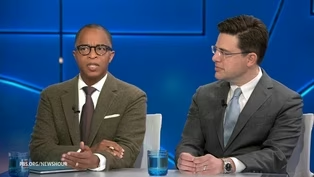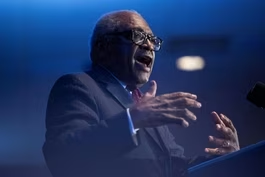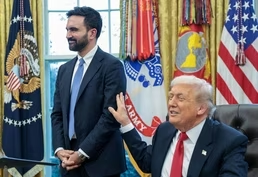
Zelenskyy pressured to accept Trump's Ukraine peace plan
Clip: 11/21/2025 | 9m 16sVideo has Closed Captions
Zelenskyy faces pressure from Trump to accept his Ukraine peace plan
President Trump said he’d like to see Ukraine accept his peace plan by Thursday of next week. But the plan asks Ukraine to make concessions it's previously rejected, and President Zelenskyy said his country has to decide whether to lose a major partner, or lose what it's been fighting for. Stephanie Sy reports on the latest and Amna Nawaz discusses more with Richard Haass.
Problems playing video? | Closed Captioning Feedback
Problems playing video? | Closed Captioning Feedback
Major corporate funding for the PBS News Hour is provided by BDO, BNSF, Consumer Cellular, American Cruise Lines, and Raymond James. Funding for the PBS NewsHour Weekend is provided by...

Zelenskyy pressured to accept Trump's Ukraine peace plan
Clip: 11/21/2025 | 9m 16sVideo has Closed Captions
President Trump said he’d like to see Ukraine accept his peace plan by Thursday of next week. But the plan asks Ukraine to make concessions it's previously rejected, and President Zelenskyy said his country has to decide whether to lose a major partner, or lose what it's been fighting for. Stephanie Sy reports on the latest and Amna Nawaz discusses more with Richard Haass.
Problems playing video? | Closed Captioning Feedback
How to Watch PBS News Hour
PBS News Hour is available to stream on pbs.org and the free PBS App, available on iPhone, Apple TV, Android TV, Android smartphones, Amazon Fire TV, Amazon Fire Tablet, Roku, Samsung Smart TV, and Vizio.
Providing Support for PBS.org
Learn Moreabout PBS online sponsorshipAMNA NAWAZ: President Trump today gave Ukraine a Thursday deadline to accept his 28-point peace plan to end the war that Russia started.
Russia is cautiously welcoming the plan, which would require Ukraine to make a number of concessions it's previously rejected.
Stephanie Sy reports on the difficult decision Ukraine must now make.
STEPHANIE SY: Today, in Ukraine, President Volodymyr Zelenskyy addressed his nation as it feces an existential dilemma.
VOLODYMYR ZELENSKYY, Ukrainian President (through translator): Right now, Ukraine may find itself facing a very tough choice, either the loss of our dignity or the risk of losing a key partner, either the difficult 28 points or an extremely hard winter, the hardest yet and the dangers that follow.
A life without freedom, without dignity, without justice?
They will expect an answer from us, though the truth is, I already gave that answer.
Ukraine's national interests must be respected.
STEPHANIE SY: Today, Russian President Putin praised the plan.
VLADIMIR PUTIN, Russian President (through translator): We have this text and received it through existing channels of cooperation with the U.S.
administration.
I believe that it can also form the basis for a final peaceful settlement.
STEPHANIE SY: Vice President J.D.
Vance and U.S.
Army Secretary Daniel Driscoll discussed the U.S.
proposal with Zelenskyy this morning.
President Trump wants it signed by Thanksgiving.
DONALD TRUMP, President of the United States: I have had a lot of deadlines, but if things are working well, you tend to extend the deadlines.
But Thursday is a -- we think it appropriate time.
STEPHANIE SY: Later in the day, President Trump had this to say: DONALD TRUMP: He will have to like it.
And if he doesn't like it, then they should just keep fighting, I guess.
STEPHANIE SY: Adding even more pressure, "PBS News Hour" has learned from senior European and U.S.
officials that the U.S.
is threatening to cut off the program that sells weapons to Ukraine and cease intelligence sharing if Ukraine rejects the administration's proposal.
The 28-point plan presented to Kyiv includes longstanding Russian demands.
Ukraine would have to limit the size of its military.
NATO would not be allowed to send any troops into Ukraine.
Ukraine would have to give up the portion of the Donetsk region that it still controls.
That would give Russia control over the entire Donbass, which would be demilitarized.
The U.S.
would recognize the Donbass, occupied Crimea, and the occupied portions of Zaporizhzhia and Kherson as de facto Russian.
In addition, NATO would change its language to prevent Ukraine's future membership.
The U.S.
would lift sanctions on Russia in stages and on a case-by-case basis.
All parties would receive full amnesty for their actions.
And $100 billion of frozen Russian assets would be earmarked for Ukrainian reconstruction.
Separately, a document details for the first time the Trump administration's definition of a security guarantee.
The text, confirmed by a senior American and European officials, states that -- quote -- "The United States affirms that a significant, deliberate and sustained armed attack by the Russian Federation across the agreed armistice line into Ukrainian territory shall be regarded as an attack, threatening the peace and security of the transatlantic community, and may lead to an armed response."
European leaders today spoke to Zelenskyy via conference call and rallied around the wartime leader, with German Chancellor Merz writing, "Ukraine can count on us," and Polish President Tusk stating, "When it comes to peace, all the negotiations should include Ukraine."
British Prime Minister Keir Starmer also weighed in.
KEIR STARMER, British Prime Minister: But we have to work from where we are to the just and lasting peace.
I know that's what President Trump wants and he's been working to that end, but we must reiterate the principle that matters about Ukraine must be determined by Ukraine.
STEPHANIE SY: The Europeans are working with Ukraine to come up with a revised plan.
For the "PBS News Hour," I'm Stephanie Sy.
AMNA NAWAZ: For more on this, we turn now to Richard Haass.
He spent decades serving Republican administrations in the State and Defense Departments and on the national security staff.
He's now president emeritus at the Council on Foreign Relations And author of the Substack Home & Away.
Richard, welcome back.
Thanks for joining us.
RICHARD HAASS, President Emeritus, Council on Foreign Relations: Thanks for having me.
AMNA NAWAZ: So before we dive more deeply into this plan, let me just ask you about President Trump's demand here that Ukraine accept this plan by next Thursday or risk losing weapon sales and intelligence sharing.
Does a deadline ultimatum like that help move closer to a deal?
RICHARD HAASS: It actually works against it because it raises questions about whether the United States is really on Ukraine's side.
Let me give you a parallel.
Imagine if President Trump had gone to Israeli Prime Minister Netanyahu and said, look, you have got a week to accept the Palestinian state.
Here are the borders.
You have got to withdraw from these settlements.
You have to accept the sharing of Jerusalem, and so many Palestinian refugees have to come back to the Palestinian state.
And if you don't agree to that, we're going to cut off American aid for Israel.
Obviously, the reaction to that would be incredibly negative and strong.
That in some ways is what we're seeing with Ukraine.
The United States is making really big,fundamental, even existential demands and is giving Ukraine a kind of one-week take-or-leave-it often.
AMNA NAWAZ: Existential demands, as you put it.
So, when you look at what Ukraine's being asked to give up here versus what's being asked of Russia, just on the territorial plans, as was just laid out, they're being asked to concede land they still control, the entire Donbass-occupied Crimea and more being recognized as de facto Russian.
Is this a plan President Zelenskyy can sell to Ukrainians?
RICHARD HAASS: I will be honest with you.
I don't think he can sell it.
I also don't think he should.
I don't think aggression should be rewarded.
And, again, there will be tremendous pushback after 3.5 years of this phase of the war.
I think the dilemma for President Zelenskyy is how to say no without saying no,and if you get into what you might call the yes, buts.
There's something here to work with.
We have concerns here.
We have concerns there.
And then the question is, how does this White House react to a situation where Russia might well accept the plan, because it's quite tilted in its favor, and Ukraine has real problems with it?
And we will have to see how that plays out.
But that's likely to be where we are in a week.
AMNA NAWAZ: What about the language in which NATO is changing its language or asked to change its language to prevent future Ukraine membership, but then the security guarantee language that includes Article 5-like protection?
Sort of unclear about when an armed response would be triggered.
Is that clear to you about where that line is being drawn?
RICHARD HAASS: No, it is unclear, as you say.
And that's a problem.
It's a difference almost between a security assurance and a security guarantee.
There's a lot of wiggle room about the nature of a Russian attack that would trigger a response.
And then there's further questioning about what would be the extent or nature of the response.
And what's so critical about that here, Amna, is, we're putting -- this proposal would put all sorts of limits on Ukraine's ability to take care of its own defense.
Essentially, it would have to trust the United States to be there for it.
But these are not ironclad assurances that are being extended.
So, again, for Ukraine, it would be an enormous risk, particularly -- and you remember this.
In 1994, the United States, Britain and Russia gave Ukraine guarantees, and, as we obviously know now, they turned out to be worthless.
AMNA NAWAZ: What about the way the European leaders have responded here, stepping into show solidarity for Ukraine, come up with a revised plan?
Could that plan replace this U.S.-led plan?
RICHARD HAASS: It could, but that's up to us, to the United States to accept it.
The danger for the Europeans is, what is it -- what are they prepared to do, what can they do if the United States basically says, sorry, we're going to walk away from Ukraine?
And there's real questions about the ability of the Europeans to step up to the role of being Ukraine's principal external security provider, but we could well be there.
AMNA NAWAZ: In the minute or so we have left, I want to pull from your years of experience.
When you step back and look at the way this process has played out, the way the U.S.
has led this negotiation, what do you take away from that?
RICHARD HAASS: It's inconsistent with my experience.
Normally, you negotiate and you work out through consultations a plan with your friends, and then you present it to your adversaries.
This was done the other way around.
So you have both the process and the content working against Ukraine.
Plus, there's the added thing that a big motive for the administration seems to be to put Ukraine on the back burner and to focus on using this to bring about a new era of U.S.-Russian relations.
So, again, Ukraine is essentially losing out here.
AMNA NAWAZ: Richard Haass, always good to speak with you.
Thank you so much for making the time to join us.
RICHARD HAASS: Thank you.
Capehart and Continetti on Trump's warm welcome of Mamdani
Video has Closed Captions
Clip: 11/21/2025 | 12m 4s | Capehart and Continetti on Trump's warm welcome of Mamdani (12m 4s)
Clyburn spotlights trailblazing Black congressmen in book
Video has Closed Captions
Clip: 11/21/2025 | 7m 6s | Clyburn spotlights trailblazing Black members of Congress in 'The First Eight' (7m 6s)
How Colorado is working to protect vaccine access
Video has Closed Captions
Clip: 11/21/2025 | 8m 52s | Colorado aims to protect vaccine access as Trump administration casts doubt on safety (8m 52s)
Oldest woman to hike Appalachian Trail reflects on journey
Video has Closed Captions
Clip: 11/21/2025 | 3m 3s | Oldest woman to hike the entire Appalachian Trail reflects on her journey (3m 3s)
Trump and Mamdani meet after months of trading insults
Video has Closed Captions
Clip: 11/21/2025 | 5m 23s | Trump and Mamdani meet in Oval Office after months of trading insults (5m 23s)
Providing Support for PBS.org
Learn Moreabout PBS online sponsorship
- News and Public Affairs

FRONTLINE is investigative journalism that questions, explains and changes our world.

- News and Public Affairs

Amanpour and Company features conversations with leaders and decision makers.












Support for PBS provided by:
Major corporate funding for the PBS News Hour is provided by BDO, BNSF, Consumer Cellular, American Cruise Lines, and Raymond James. Funding for the PBS NewsHour Weekend is provided by...





